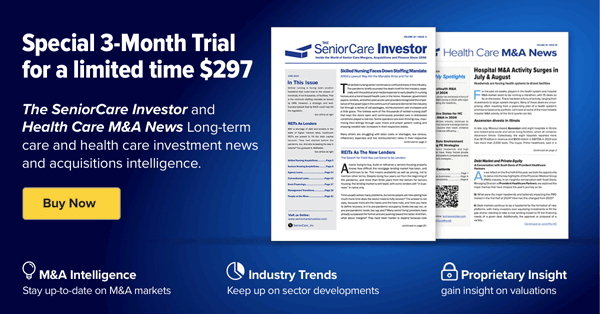Here’s a prediction: Healthcare M&A will remain strong in 2020, at least until the November presidential election. Unless a recession hits before then. All of the analysts, lawyers and investment bankers we’ve spoken to in recent months agree on that scenario. Everyone is seeing robust deal flow and/or pipelines but knows the uncertainties that are sure to play out through the Democratic presidential primaries and into the general election could adversely affect this market.
Their predictions are based on what has become status quo in the financial world. Low inflation, low cost of capital and a lot of money sitting in private funds on the sidelines, just waiting to get into the game. All agree that the current “hot” sectors—behavioral health care, telehealth/ telemedicine, home health & hospice and physician medical groups—will remain strong well into the new year.
But what trends are they watching that will impact healthcare deals through 2020 and beyond? That’s where it gets interesting. Here are some views from deal makers we’ve spoken with.
Managing chronic conditions such as diabetes, COPD and cardiac conditions will be a top priority, several agreed. The current healthcare system is geared to treat highacuity cases, not chronic conditions, according to Bobby Guy, shareholder at Polsinelli. The system is only good at treating chronic care when it becomes acute. That means more care will have to take place outside a hospital’s walls and take place regularly.
That model presents “a huge opportunity” to make money and affect patients lives, he said. Home health care and senior care providers already have a lot of experience treating patients with these conditions, and
those fragmented markets will see growing consolidation.
Kevin Ryan, a member of Epstein Becker Green, expects we’ll see more and more remote patient care done through apps, artificial intelligence and computers. “We’re going to see more ways patients connect with providers,” he said, particularly via telehealth. The goal is to catch and manage chronic conditions proactively, through medication management and remote monitoring. Ryan says this push will lead to even more deals in software, data analysis and HIPPA-compliant communication systems between patients and providers.
Don’t take your eyes off Amazon (NASDAQ: AMZN), either. Jim Jenkins, a member of Bass Berry & Sims, says Amazon got his attention with its acquisition of PillPack in 2018 and its recent deal for Health Navigator. The start-up’s platform integrates with digital health services to standardize patient care and provides online symptom checking and triage tools to companies that are trying to route patients to the proper level of care.
Amazon is embedded in most consumers’ lives now, and eventually it’s Alexa smart-speaker will be able to dispense health advice with the help of artificial intelligence. “That’s going to be fascinating to watch,” he said.
Polsinelli’s Guy is looking to the major technology companies in Silicon Valley and Seattle to solve the problem of personal healthcare data stuck in silos. “There are massive consolidation opportunities around patient health information,” he said, even before the major issue of who owns your personal health data is settled. “The lack of coordinated care contributes to unhealthy behavior and unnecessary procedures.” Data portability is key to dealing with health issues before they become chronic conditions.
Mark Kulik, managing director at The Braff Group, is bullish on the post-acute care market even as the Patient Driven Groupings Model (PDGM) dominates all conversations. “Consolidation is coming in home health in 2020,” he said. “There are around 12,000 agencies across the country. Is there a need for that many?”
He’s watching the growth in popularity of Medicare Advantage plans that promise no co-pays, free dental and vision care. Next year, 150 plans will begin reimbursing non-skilled home health care. And he notes that private equity, which very actively building post-acute care platforms, likes to disrupt markets. “They bring technology, capital, talent and relationships that affect everything.”

